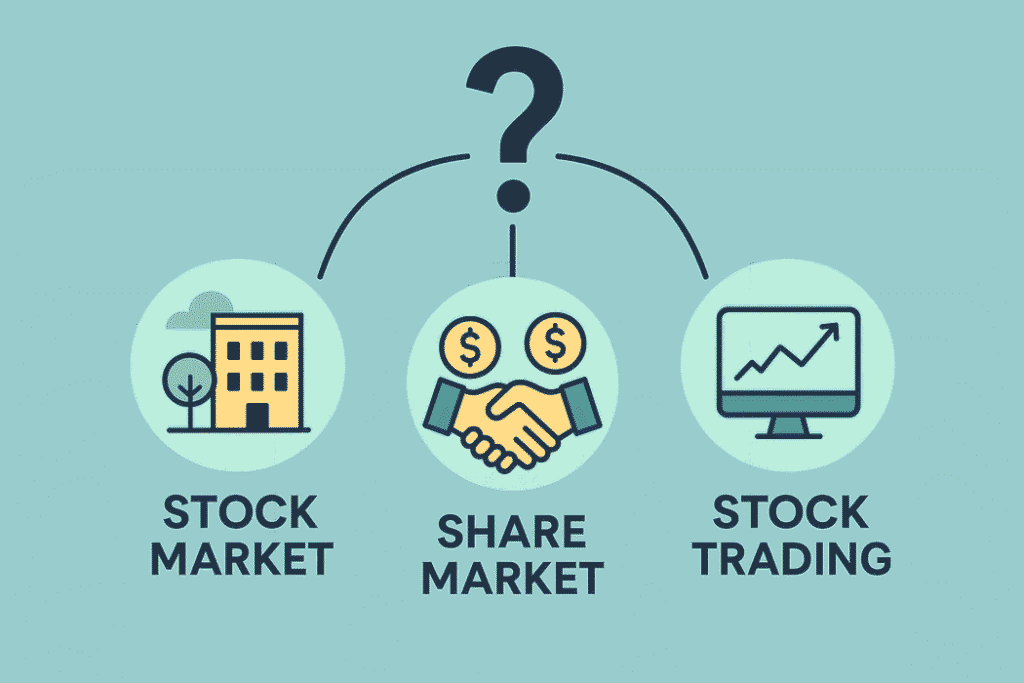Introduction
If you’ve ever heard people talk about the Stock Market, Share Market, or Stock Trading and felt confused about what they really mean, you’re not alone! These terms are often used interchangeably, but they actually have different meanings.
In this article, we’ll break down these concepts in a way that’s easy to understand. You’ll learn what a company is, what stocks and shares really mean, how they can help companies grow, and the basics of trading.
So whether you’re just getting started or want to clear up some confusion, this post will give you all the info you need to feel more confident about the stock market and how it all works.

What is a Company?
A company is a type of business organization formed by one or more people to carry out activities—usually to earn profit. Once a company is legally registered (also called incorporated), it becomes a separate legal entity from its owners. This means:
- It can own property
- It can open bank accounts
- It can sue or be sued
- It has to pay its own taxes
the different types of companies:
Private Company (Private Limited Company)
A Private Limited Company, often written as Pvt Ltd, is a type of company where:
The business is owned by a small group of people, usually friends or family.
It is not allowed to sell its shares to the public.
It usually has a minimum of 2 and maximum of 200 members.
Features of Private Company :
- Private Ownership – Only selected people can own shares.
- Limited Liability – The owners’ personal assets are safe if the company loses money.
- Legal Entity – It is separate from the owners in the eyes of law.
Example: A family-owned tech startup or a boutique clothing brand.
One Person Private Company (OPC)
A One Person Company (OPC) is a special kind of private company where only one person owns and manages the entire company.
Features of small company:
- Single Owner – Only one person runs the business.
- Limited Liability – The owner’s personal money is not at risk if the company goes into loss.
- Simpler Compliance – Fewer rules to follow compared to larger companies.
- Ideal for Solo Entrepreneurs – Great for people who want to start a company alone.
Example: A freelance software developer starting a solo tech firm.
Small Private Company
A Small Company is actually a type of private company that is defined based on its money size and number of employees.
According to rules (in many countries including India):
- Its paid-up capital should be below a certain limit (like ₹4 crore in India).
- Its turnover (total sales) should also be below a set amount (like ₹40 crore in India).
Features of small company :
- Less Paperwork – Fewer rules and lighter compliance.
- Smaller Team – Usually run by a small group of founders or partners.
- Mostly Startups – Great for new or early-stage businesses.
Note: All small companies are private companies, but not all private companies are small companies.
Public Company
A Public Company is a business that can sell its shares to the general public through the stock market.
Features of Public Company:
- Owned by Many Shareholders – Anyone can buy a share and become a part-owner.
- Listed on Stock Exchanges – Like NSE, BSE, NYSE, etc.
- Highly Regulated – Must follow strict rules and report financials publicly.
- Can Raise Big Money – Because many people can invest in it.
Example: Big companies like Reliance, TCS, Tata Motors, or Apple.
Summary Table : Types of Companies
| Type of Company | Owners | Can Sell Shares Publicly? | Ideal For |
| Private Company (Pvt Ltd) | 2 to 200 people | No | Family businesses, startups |
| One Person Company (OPC) | 1 person | No | Solo entrepreneurs |
| Small Private Company | Small group | No | Early-stage small firms |
| Public Company | Unlimited investors | Yes | Big corporations |
What is a stock?
A stock (also called a share) represents a small ownership in a company. When you buy a stock, you become a shareholder, meaning you own a part of that company.
Think of a company like a big pizza 🍕. If the company is divided into 100 slices (shares), and you own 10 slices, you own 10% of that company. That’s how stocks work.
Why Do Companies Sell Stocks?
Companies need money to grow their business—like opening new stores, launching new products, or paying off debts. So instead of taking loans, they sell stocks to the public through something called an Initial Public Offering (IPO).
By selling stocks:
- Companies raise funds
- Investors (like you) get a chance to own a part of the business
It’s a win-win!
Where Are Stocks Bought and Sold?
Stocks are traded (bought and sold) in the stock market. Popular stock exchanges include:
- NYSE (New York Stock Exchange)
- NASDAQ
- BSE and NSE (India)
You can buy stocks using a broker or through online trading apps.
How Do You Make Money from Stocks?
There are two main ways you can earn money from stocks:
- Capital Gain
If you buy a stock at ₹100 and sell it later at ₹150, you make a profit of ₹50. This is called a capital gain. - Dividends
Some companies share part of their profit with shareholders. This is called a dividend. Not all companies pay dividends, but many stable ones do.
Do Stocks Come with Risk?
Yes. Stocks can go up or down in price based on:
- Company performance
- Market trends
- Global news and events
That’s why stock investing involves risk—you can earn money, but you can also lose it.
What is a Share?
A share is a unit of ownership in a company. When you buy shares of a company, you become a part-owner of that company. The more shares you own, the bigger your ownership.
Imagine a company is like a big chocolate cake 🍰. If the cake is cut into 100 equal pieces (shares), and you own 10 of those pieces, you own 10% of the cake—or in this case, 10% of the company.
Why Do People Buy Shares?
People buy shares for two main reasons:
- To Make a Profit
If the company does well, the value of its shares increases. You can sell them at a higher price than you bought them for and make a profit. This is called a capital gain. - To Earn Dividends
Some companies share their profits with shareholders in the form of dividends. So even if you don’t sell your shares, you can earn money regularly from them.
Why Do Companies Sell Shares?
Companies need money to grow. They can raise money by selling shares to the public. When you buy those shares, you give money to the company, and in return, you become a small owner.
This process is called an Initial Public Offering (IPO) when it happens for the first time.
Are Shares and Stocks the Same?
Yes, in most cases. The words “shares” and “stocks” are often used to mean the same thing—part ownership in a company. But “shares” usually refer to the number of units, while “stock” refers to the overall investment.
What is Trading?
Trading is the act of buying and selling things to make a profit. In the world of finance, trading usually means buying and selling financial assets like:
- Stocks (shares of companies)
- Bonds
- Commodities (like gold or oil)
- Currencies (like USD, INR, EUR, etc.)
- Cryptocurrencies (like Bitcoin)
Traders aim to buy at a lower price and sell at a higher price, often in a short period of time.
Trading vs. Investing
People often confuse trading with investing, but they are different:
| Investing | Trading |
| Long-term | Short-term |
| Focused on company value | Focused on price movements |
| Less frequent buying/selling | Frequent buying/selling |
| Lower risk | Higher risk |
- Investors hold stocks for years.
- Traders might buy and sell on the same day.
Types of Trading
There are different types of trading based on how long you hold an asset:
- Day Trading – Buy and sell within the same day
- Swing Trading – Hold for a few days or weeks
- Scalping – Make many small trades in minutes or seconds
- Position Trading – Hold for weeks or months (but still shorter than investing)
Is Trading Risky?
Yes. Prices can go up or down quickly, and traders can lose money if they make the wrong decision. That’s why knowledge, research, and discipline are important in trading.
Many beginners start trading without understanding the risks and end up with losses.
- How to invest?
What Is the Stock Market?
The stock market refers to the overall ecosystem where the buying and selling of stocks, bonds, mutual funds, ETFs, and other financial instruments happen. It’s not a single place—it’s a network of markets and exchanges.
Think of it like a marketplace:
- It includes major exchanges like t he New York Stock Exchange (NYSE) or NASDAQ.
- It tracks all types of company shares—big and small, tech or banking.
- It’s governed by rules, regulators (like the SEC in the US), and financial institutions.
Note::
The stock market is the big umbrella that holds everything related to trading financial securities.
What Is the Share Market?
The share market is essentially a subset of the stock market, focusing specifically on shares (or stocks) of companies.
In simple word:
- “Shares” refer to the units of ownership in a company.
- The share market is where these shares are issued, bought, and sold.
You’ll often hear people in countries like India, Australia, or the UK use “share market” more commonly, while in the US, “stock market” is the preferred term.
Are they the same thing?
Pretty much—when people say “share market” or “stock market,” they’re often talking about the same activity: trading ownership in companies.
But technically, the stock market is broader (it includes other assets beyond just shares).
What Is Stock Trading?
Stock trading refers to the action of buying and selling stocks (or shares) in the market.
It’s an activity people do within the stock or share market.
Elements of stock trading:
- It can be long-term (investing) or short-term (trading)
- It includes different styles: day trading, swing trading, position trading
- Traders aim to profit from price movements in the short term
Think of it this way:
- The stock market is the entire city.
- The share market is a neighborhood in that city focused on houses (company shares).
- Stock trading is what people do—buying and selling those houses.
Conclusion: Clearing the Confusion
| Term | Meaning |
| Stock Market | Broad marketplace for all types of financial securities |
| Share Market | Specific part of the stock market dealing with company shares only |
| Stock Trading | The actual action of buying and selling stocks for profit |
Disclaimer: The information provided on this blog is for educational purposes only and should not be construed as financial advice. The stock market and other investment vehicles involve significant risks, including the potential loss of principal. While every effort is made to ensure the accuracy of the information presented, the author and ” stoxcues.com ” do not guarantee the completeness, reliability, or suitability of any investment strategies or recommendations. It is strongly recommended that you consult with a qualified financial advisor or professional before making any investment decisions. Past performance is not indicative of future results.



